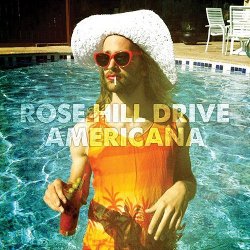|
|
|
|
 |
||
|
|
|
Returning from a year's hiatus retooled as a quartet, Rose Hill Drive give a new definition to Americana on their similarly title studio album, the first on their own label. While there will be those who mourn the loss of purity as a three piece, the foursome isn't much less raw, at least as the Sproul brothers on guitars wind it out on the title track while drummer Nate Barnes whacks away maniacally below the vaguely Chuck Berry-derived chord patterns.
New recruit Jimmy Stofer adds a gigantic punch with his bass on "Telepathic," where the sound of the recording comes through especially clearly; RHD have always kept production to a minimum and the new album continues in that vein, the mix allowing only for Jake Sproul's voice to be deftly placed in the midst of all the surrounding cacophony. Still, there's a hint of claustrophobia here as if some -- or all -- of the four don't have enough room to play like they want.
And, truth be told, there is something unsettling about the regular prominence of keyboards in Rose Hill Drive, even if, as on "Pictures of You," it's the cheesy strains of Farfisa: that in itself not likely to deflect the potential backlash at the band. The chording on "Speed Dial," though, evinces some influences of The Beatles, especially as Stofer unleashes a bomb or two to introduce the booming drums and subsequent howl of guitars mixed with the keys.
How distinctive, though, does Rose Hill remain after the sonic amendments? "Psychoanalyst" renders the point moot, at least momentarily, as Jake's voice goes airborne over crunching riffs that threaten to obliterate the Farfisa (again). The staccato guitar hearkens to another era -- in a positive sense -- as the elemental hard rock approach of Britain permeates the latter section of that cut, suggesting more extended tracks might benefit Americana: as the record clocks in at slightly less than forty minutes, more cuts like the aforementioned would put the textural changes in the proper perspective. And that's not to mention how an album of greater duration would also exhibit more new material (the band reportedly had some seventy demos to work from), the piano-dominated likes of which concludes the album somewhat cryptically during "Birthdays and Breakups."
Different proportions of varied sounds, perhaps including even more of the sweet acoustic strains that populate "Birds Against the Glass," might alleviate the slightly stunted nature of Americana. As it is, all too much of this cd sounds strained, as if RHD want to fully flex their muscles, but are fearful of showing off.
related articles
Shows: Rose Hill Drive
Shows: Tatanka Music Festival
Features: Conversation with Jake Sproul of Rose Hill Drive
Albums: Rose Hill Drive - Moon is the New Earth
Magazine: State of Mind - Aug/Sep 2008
More on: Rose Hill Drive
Shows: Rose Hill Drive
Shows: Tatanka Music Festival
Features: Conversation with Jake Sproul of Rose Hill Drive
Albums: Rose Hill Drive - Moon is the New Earth
Magazine: State of Mind - Aug/Sep 2008
More on: Rose Hill Drive
new to state of mind
Shows: moe.
Shows: Yonder Mountain String Band
Shows: Grand Point North 2014
Shows: Catskill Chill 2014
Shows: moe.down 15
Shows: Gov't Mule
Shows: Umphrey's McGee
Shows: Newport Folk Festival 2014
Shows: Widespread Panic
Albums: Phish - Fuego
Shows: moe.
Shows: Yonder Mountain String Band
Shows: Grand Point North 2014
Shows: Catskill Chill 2014
Shows: moe.down 15
Shows: Gov't Mule
Shows: Umphrey's McGee
Shows: Newport Folk Festival 2014
Shows: Widespread Panic
Albums: Phish - Fuego
most popular
Blog: New Video/Song From Dr. Dog - "Broken Heart"
Blog: Radiohead: Adam King tries to convince me they are aliens…
Blog: Mountain Oasis welcomes NIN‚ Bassnectar and Pretty Lights
Blog: Mehliana Tour (Brad Mehldau + Mark Guiliana)
Blog: Video: Club d'Elf with Marco Benevento - "Bass Beatbox"
Blog: Reed Mathis and Victor Wooten Talk Bass
Features: Conversation with Kurt Rosenwinkel
Features: Conversation with Tommy Benedetti of John Brown's Body
Features: Conversation with Bill Kreutzmann
Shows: Rothbury 2009
Blog: New Video/Song From Dr. Dog - "Broken Heart"
Blog: Radiohead: Adam King tries to convince me they are aliens…
Blog: Mountain Oasis welcomes NIN‚ Bassnectar and Pretty Lights
Blog: Mehliana Tour (Brad Mehldau + Mark Guiliana)
Blog: Video: Club d'Elf with Marco Benevento - "Bass Beatbox"
Blog: Reed Mathis and Victor Wooten Talk Bass
Features: Conversation with Kurt Rosenwinkel
Features: Conversation with Tommy Benedetti of John Brown's Body
Features: Conversation with Bill Kreutzmann
Shows: Rothbury 2009
